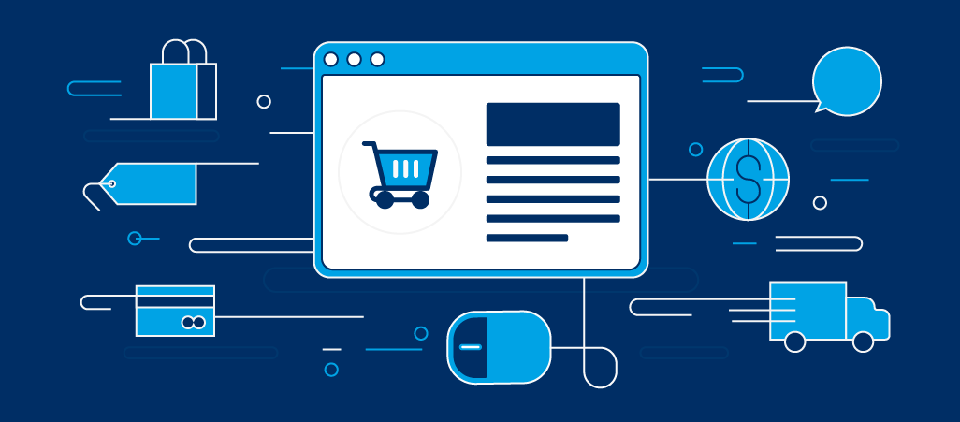
In the modern digital world, running an online store has become a vital part of business strategy. With e-commerce continuing to thrive and evolve, choosing the right ecommerce platforms is one of the most crucial decisions any entrepreneur or business owner will make. Whether you’re launching a small business or scaling an established brand, the ecommerce platforms you choose will have a profound impact on your success.
In this article, we will explore the ins and outs of ecommerce platforms, what to look for when selecting one, and how the right platform can support your business goals. We will also examine some of the best-known platforms on the market and offer practical advice for getting started.
What are Ecommerce Platforms?
An ecommerce platform is a software solution that allows businesses to create, manage, and operate an online store. It provides the tools needed to sell products or services over the internet and can handle everything from product listings to payments, inventory management, and customer support.
There are several types of ecommerce platforms, including open-source platforms (where the code is available to modify), hosted platforms (where the platform takes care of hosting and maintenance), and SaaS (Software as a Service) platforms, which are subscription-based services.
Essentially, an ecommerce platform is the backbone of any online store, and choosing the right one is critical for ensuring smooth operations, great customer experiences, and growth potential.
Key Features to Look for in Ecommerce Platforms
Selecting the right ecommerce platforms is more than just about price. There are several important factors to consider, depending on your business’s needs and future aspirations. Below are key features that an ideal ecommerce platform should offer:
1. User-Friendly Interface
The usability of an ecommerce platform is paramount, especially if you’re not technically savvy. The platform should have an intuitive, easy-to-navigate dashboard that allows you to quickly add products, manage orders, and customize your online store without needing to write code.
2. Mobile Optimization
With mobile shopping growing rapidly, having a mobile-optimized store is non-negotiable. The ecommerce platform you choose should automatically adjust your site for mobile devices or offer mobile-friendly themes that ensure a seamless experience for customers browsing and shopping on smartphones or tablets.
3. Payment Gateway Integration
A reliable and secure payment system is at the heart of any online store. Your ecommerce platform should integrate easily with popular payment gateways like PayPal, Stripe, or credit card processors, providing a smooth and secure checkout experience for your customers.
4. SEO Capabilities
Search engine optimization (SEO) is vital for ensuring that your products or services are found by potential customers. A good ecommerce platform should offer tools to optimize product listings, meta tags, URLs, and images, helping your store rank well on search engines like Google.
5. Security Features
Security should always be a priority. Your ecommerce platform should offer SSL encryption, secure checkout options, and regular security updates to protect both your business data and customer information from breaches or fraud.
6. Customizability
Every business is unique, and your online store should reflect that. The ecommerce platform you choose should offer a range of customizable themes, apps, and design features to give your site a personalized look that aligns with your brand.
7. Inventory Management
Managing your products, stock levels, and orders is essential for smooth business operations. Look for an ecommerce platform that provides a strong inventory management system that tracks stock levels in real time, alerts you when items are running low, and helps streamline the fulfillment process.
8. Scalability
As your business grows, your ecommerce platform should be able to grow with you. Scalability ensures that your platform can handle increased traffic, product listings, and sales volume without compromising performance or user experience.
9. Customer Support Tools
An effective ecommerce platform should include tools to engage with customers, such as live chat, email support, and a comprehensive help desk system. Customer service is a critical part of maintaining customer satisfaction and retention.
Types of Ecommerce Platforms
There is no “one size fits all” when it comes to ecommerce platforms. Depending on your business model, technical expertise, and growth potential, different platforms may better suit your needs. Below are the three primary types of ecommerce platforms:
1. Hosted Ecommerce Platforms
Hosted ecommerce platforms are all-in-one solutions where the platform handles hosting, software maintenance, and security updates. These platforms are typically subscription-based, and the hosting is included in the monthly fee.
Examples of hosted ecommerce platforms include:
- Shopify: Known for its ease of use, flexibility, and scalability, Shopify is one of the most popular hosted ecommerce platforms. It’s ideal for small to medium-sized businesses and offers a large selection of themes, apps, and integrations.
- BigCommerce: A robust platform that offers advanced features for growing businesses, BigCommerce supports multiple sales channels and offers powerful SEO tools and integrations.
Pros of hosted platforms:
- No need for technical knowledge (platform handles hosting and maintenance).
- Scalable with various pricing plans.
- Easier to set up and manage.
Cons of hosted platforms:
- Limited customizability compared to self-hosted platforms.
- Monthly subscription fees can be high, especially for advanced plans.
2. Self-Hosted Ecommerce Platforms
Self-hosted platforms allow you to download the software and install it on your own server. While you’ll have to manage your own hosting and technical aspects, you have more control over customization, features, and overall functionality.
Examples of self-hosted ecommerce platforms include:
- WooCommerce: A WordPress plugin that allows you to add e-commerce functionality to your WordPress site. WooCommerce is free to use but requires additional hosting and security management.
- Magento Open Source: A powerful open-source ecommerce platform for large businesses with complex needs. Magento offers a high level of customization but requires significant technical expertise to set up and manage.
Pros of self-hosted platforms:
- Full control over design, features, and functionality.
- Ability to integrate third-party applications.
- Often more cost-effective for large stores.
Cons of self-hosted platforms:
- Requires technical knowledge (hosting, security, updates).
- You are responsible for server management and maintenance.
3. Software as a Service (SaaS) Ecommerce Platforms
SaaS ecommerce platforms are cloud-based and offer a fully managed solution, meaning that everything from software to hosting is handled by the provider. These platforms typically operate on a subscription model, but unlike hosted platforms, SaaS providers often provide a higher level of customization and integration options.
Examples of SaaS ecommerce platforms include:
- Big Cartel: A simple and affordable SaaS platform tailored for artists and independent makers, Big Cartel focuses on simplicity and ease of use.
- Squarespace Commerce: Squarespace provides an easy-to-use website builder with integrated ecommerce features, making it ideal for small businesses and creatives.
Pros of SaaS platforms:
- No technical expertise required for setup or maintenance.
- Quick to set up and user-friendly.
- Typically includes hosting and security features.
Cons of SaaS platforms:
- Limited customization compared to self-hosted solutions.
- Monthly subscription fees can add up, especially with advanced plans.
Popular Ecommerce Platforms on the Market
Now that we’ve discussed the various types of ecommerce platforms, let’s take a closer look at some of the most popular platforms currently on the market.
1. Shopify
Shopify is one of the leading ecommerce platforms, powering over 1 million businesses worldwide. It’s known for its simplicity, user-friendly interface, and scalability. Shopify is ideal for businesses of all sizes, offering various plans that cater to small businesses as well as large enterprises.
Features include:
- Over 70 customizable themes
- 24/7 customer support
- A vast app marketplace
- Built-in SEO features
2. WooCommerce
WooCommerce is a WordPress plugin that turns any WordPress website into a fully functional online store. It’s an open-source ecommerce platform, meaning you have complete control over customization and functionality.
Features include:
- Free to use (with paid extensions)
- Wide range of themes and plugins
- Easy integration with WordPress
- Extensive support community
3. BigCommerce
BigCommerce is a feature-rich platform ideal for growing businesses that need advanced ecommerce functionality. It’s a hosted solution that provides a wide range of tools to help businesses scale efficiently.
Features include:
- Multi-channel selling (Amazon, eBay, Facebook)
- Advanced SEO tools
- Built-in shipping integrations
- 24/7 support
4. Magento
Magento is a powerful, open-source ecommerce platform that is ideal for large businesses with complex requirements. It’s highly customizable, but it requires significant technical expertise to set up and manage.
Features include:
- Highly customizable themes and extensions
- Advanced product catalog management
- Strong scalability
- Large developer community

How to Choose the Right Ecommerce Platform
Choosing the right ecommerce platform for your business is essential to your online success. Here are a few key factors to consider when making your decision:
1. Consider Your Business Size and Budget
Small businesses may benefit from hosted solutions like Shopify, while larger enterprises might require the flexibility and scalability of platforms like Magento or BigCommerce. Keep in mind your current budget and future growth potential.
2. Evaluate the Features You Need
Different ecommerce platforms come with different features. Make sure to assess your specific business needs, such as mobile optimization, SEO tools, payment processing, and integration with third-party tools.
3. Assess Ease of Use vs. Customization
If you’re looking for a simple and fast way to launch your store, a user-friendly platform like Shopify or Big Cartel may be the best option. However, if you need more control over your store’s functionality, a self-hosted platform like WooCommerce or Magento may be a better fit.
4. Check Customer Support
Reliable customer support is essential for resolving issues quickly. Look for an ecommerce platform that offers multiple support channels, including phone, email, and live chat.
Conclusion
Choosing the right ecommerce platform is one of the most important decisions you’ll make when launching an online store. The platform you select will directly impact your ability to grow your business, reach customers, and offer an enjoyable shopping experience. Whether you’re looking for a simple, all-in-one hosted solution or a more customizable self-hosted platform, there are options available for every type of business.
Take the time to carefully evaluate your needs, budget, and long-term goals to ensure you select the platform that’s right for you. With the right ecommerce platform, your business can thrive in today’s fast-paced digital landscape.

